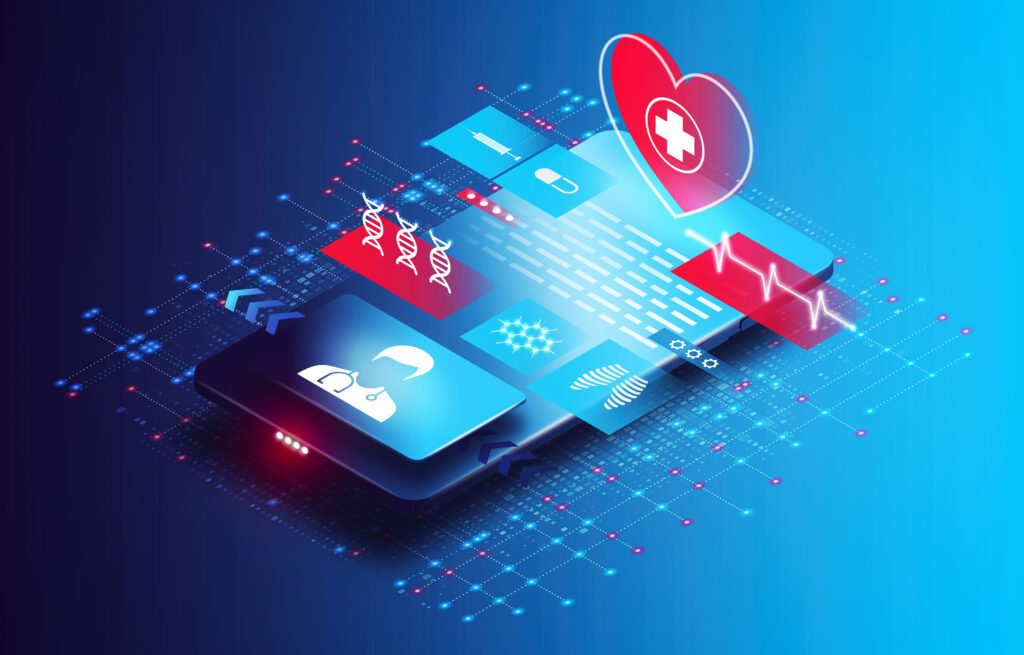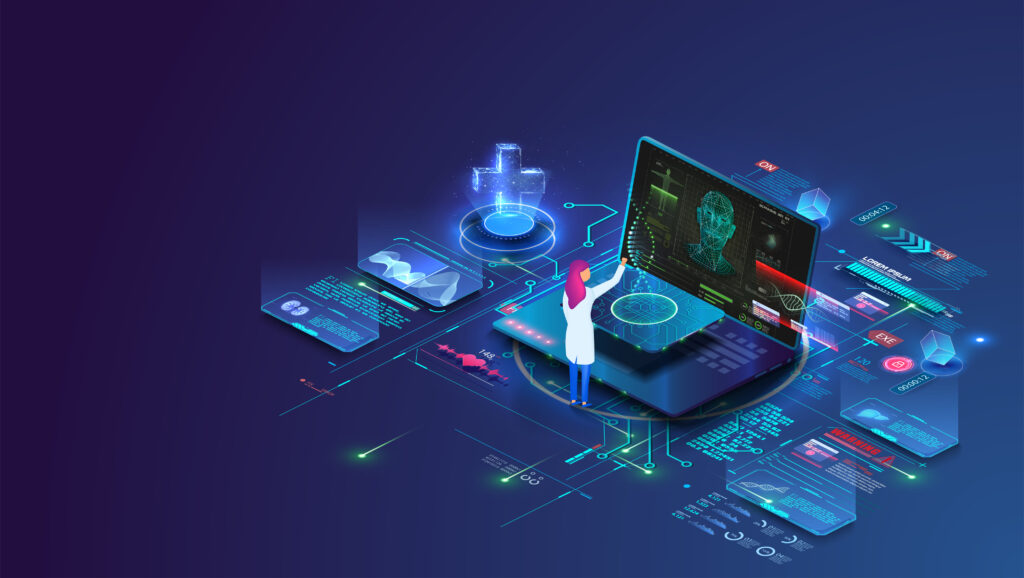Healthcare software development is the creation of software to facilitate healthcare. Healthcare software systems and applications allow users to manage health records, monitor patients, provide diagnoses and treatments, and more.
Some of the top priorities for healthcare organizations are improving patient care and reducing costs. High-quality software that’s easily maintained and updated over time is essential, but it’s not easy to keep up, considering how rapidly technology advances.
From patient to provider, healthcare software development is critical. There are many ways to improve healthcare technology, and new ideas are constantly emerging. Reaching out to experienced developers can accelerate the process.
Common Types Of Healthcare Software

As the healthcare industry evolves, modern technology helps manage operations and patient care.
Healthcare IT (Healthcare Information Technology) meanwhile has come a long way from the paper charts and filing systems once used for patient data and billing.
Today, a plethora of healthcare software development services are available to streamline operations and make the lives of physicians, nurses, and other medical professionals easier.
Here are some common software solutions used in healthcare:

- EHR (electronic health recording) software is a digital database used to collect information about patients and provide data analytics for their medical history and more.
- Hospital management software is a fully integrated system that assists medical workers and hospital administration in their daily tasks.
- Medical billing software automates billing processes and keeps track of all financial operations.
- Telemedicine software makes medical treatment online accessible and effective and may include a mobile app.
- E-Prescribing software makes it easier for doctors to control medication prescriptions for their patients.
- Appointment scheduling software automates patient scheduling by coordinating provider calendars with patient appointment requests and confirming available time slots.
- Laboratory Information Systems manage samples, associated data, and laboratory users. Besides, it also automates workflows to improve the efficiency and consistency of lab processes.
- Clinical Decision Support Systems provide clinicians with patient-specific assessments of recommendations to enhance patient care.
- Pharmacy Management Systems help in the dispensation of medications, inventory management, and billing.
- Picture Archiving & Communication Systems (PACS) are used in radiology to store, retrieve, present, and share images, as a digital alternative to hard-film X-rays.
- Remote Patient Monitoring Systems are designed to monitor patients outside of conventional clinical settings to provide timely care and continuous monitoring.
- Mobile Health Apps provide patients with resources and tools on their smartphones, ranging from medication reminders to real-time chat with medical professionals.
- Patient Portal Software allows patients to access their medical records, book appointments, view billing information, and communicate with healthcare providers.
- Practice Management Software helps medical practitioners manage daily operations, from scheduling to billing, helping streamline administrative tasks.
What Are The Benefits of Healthcare Software?

The healthcare software development plays a pivotal role in enhancing service quality and operational efficiency.
Healthcare software solutions become more sophisticated. As the result, their benefits extend not just to medical professionals but also to patients and the broader healthcare institutions.
Let’s delve into the advantages these solutions bring to each segment of the healthcare ecosystem.
Benefits For Doctors
- Diagnostic Assistance: Advanced diagnostic tools and AI-powered software can assist doctors in diagnosing complex cases, ensuring early and accurate detection of ailments.
- Continued Medical Education: Through integrated platforms, doctors can access the latest medical research, attend virtual seminars, and participate in webinars, ensuring they remain at the forefront of medical advancements.
- Clinical Decision Support: Some software solutions provide real-time assistance in decision-making by analyzing patient data and offering evidence-based recommendations.
- Secure Peer Communication: Secure channels allow doctors to discuss cases with peers, ensuring patient confidentiality while fostering collaboration.
- Telehealth Capabilities: Doctors can expand their reach, offering consultations to patients in remote locations, thereby increasing their patient base.
- Research Opportunities: Integrated research tools can assist doctors in contributing to clinical studies and trials.
- Time Management: Automated appointment reminders, scheduling tools, and other organizational features ensure efficient time management.
- Resource Accessibility: Instant access to a vast array of medical literature, case studies, and journals aids in treatment planning.
- Personalized Treatment Plans: AI and machine learning can help in curating treatment plans based on individual patient data and predictive analytics.
- Automated Reporting: Automatic generation of reports, charts, and graphs simplifies the monitoring of patient progress.
- Reduced Medication Errors: Integrated drug databases can alert doctors to potential drug interactions or allergies, ensuring patient safety.
- Remote Patient Monitoring: Doctors can continuously monitor patients’ vitals and health metrics using connected devices, enabling proactive interventions when necessary.
- Enhanced Patient Engagement: Tools that facilitate patient education and communication can improve treatment adherence and overall patient outcomes.
- Digital Health Records: Instant access to digitized health records ensures that doctors have a comprehensive view of the patient’s history, even if they’ve consulted with other specialists or have been treated at different facilities.
- Cost Efficiency: While there’s an initial investment in software solutions, they can lead to cost savings in the long run through increased efficiency and reduced errors.
Gains for Patients
- Enhanced Patient Outreach: Fosters better channels for doctor-patient communication.
- Personalized Care Plans: With the help of AI and data analytics, patients can receive care plans tailored to their unique health needs and conditions.
- Educational Resources: Many healthcare software platforms offer educational materials, videos, and articles, enabling patients to understand their conditions and treatments better.
- Easier Billing and Payments: Integrated payment gateways make it simpler for patients to understand, review, and pay their medical bills, reducing financial stress.
- Privacy and Control: Patients have better control over who sees their medical data and can provide selective access to specialists or family members.
- Medication Management: Reminder systems can help patients keep track of medication schedules, ensuring adherence and better treatment outcomes.
- Virtual Consultations: Telemedicine allows for virtual doctor visits, providing convenience and saving time, especially for routine check-ups or follow-ups.
- Instant Feedback: Patients can provide feedback instantly after consultations, aiding in the improvement of services.
- Second Opinion Accessibility: Software can facilitate the process of seeking a second opinion, giving patients more confidence in their treatment decisions.
- Health Progress Tracking: With the integration of health tracking apps, patients can monitor their health progress over time, set goals, and celebrate milestones.
- Access to Community Support: Some platforms provide forums or community sections where patients can connect with others experiencing similar health issues, fostering a sense of support and community.
- Emergency Services: Integration with emergency services ensures quicker response times in critical situations.
Benefits for Healthcare Organizations
- Cost Efficiency: By automating various processes, healthcare organizations can reduce operational costs, manual errors, and resource wastage.
- Data Security: With enhanced cybersecurity features, these software solutions can protect sensitive patient data from breaches, thereby ensuring compliance with regulations and preserving organizational reputation.
- Scalability: Modern healthcare software allows organizations to easily scale their operations, catering to an increasing number of patients without compromising on service quality.
- Decision-making Support: Advanced analytics and reporting tools help leaders make informed decisions, from patient care strategies to financial planning.
- Interdepartmental Integration: Different departments can communicate and collaborate more effectively, ensuring a holistic approach to patient care and facility management.
- Data-Drive Decision Making: Healthcare software solutions provide valuable insights derived from data analytics. Therefore, by analyzing patterns and trends, organizations can forecast future needs, optimize costs, and improve overall efficiency.
- Compliance Management: Integrated modules help in adhering to ever-evolving healthcare regulations, ensuring compliance and avoiding potential legal issues.
- Enhanced Revenue Management: Efficient billing, insurance claim processing, and financial tracking tools ensure a smoother revenue cycle, reducing financial leaks and increasing profitability.
- Patient Engagement: Through portals and mobile apps, organizations can enhance patient engagement, offering education, reminders, and health tracking tools that promote proactive health management.
- Ecosystem Integration: Healthcare organizations can easily integrate with external partners to enable a comprehensive healthcare ecosystem.
- Disaster Recovery: Advanced backup and recovery features ensure that in the event of unexpected issues, data is preserved, and operations can resume swiftly.
- Improved Business Management: Optimizes operations and eliminates unnecessary overlap.
- Increased Patient Satisfaction: Ensures swift services, clear communication, and superior healthcare outcomes.
What Are The Stages Of Healthcare Software Development?

The process of healthcare software development can be divided into three stages: planning, design and development, and implementation.
The planning stage is when all the significant decisions regarding the project’s specifics are made, including selecting a platform, determining functionalities, creating a timeline, and conducting feasibility studies.
After this stage is complete, the design and development stage begins with analyzing the information gathered during planning. During this phase, features are created and approved, and the user interface is designed based on these features with specific target groups in mind (such as doctors or nurses).
The implementation stage involves coding based on the designs and ideal UX. When all stages are completed, it’s time to test everything and ensure correct functioning before releasing it to users.
Here are some specifics that occur in each stage:
Planning
- Pre-project work
- Preliminary collection of requirements
- Preparation of an initial estimate of the budget and timing
- Clarification of requirements and update of the assessment
- Coordination between the service provider and you
- Analytics
- Understanding what features and use cases need to be part of the application
- Agreeing on an interactive application prototype
- Writing terms of reference
Design and development
- Mobile application development
- Application interface layout
- Implementing navigation between screens
- Logic programming
- Server API integration
- Server development
- Database development
- Server API development
- Writing API documentation
- Admin panel development
- Integration with third-party systems
Implementation
- Publication in app stores
- Registration in app stores
- Preparation of application pages in the app stores
- Preparing and uploading screenshots
- Laying out builds
- Passage of moderation
- Support and development
- Elimination of bugs and errors
- Additional development of new functions upon request
The Advantages of Outsourcing Healthcare Software Development

Outsourcing healthcare software development offers significant advantages, making it a preferred option for many organizations.
It not only saves time and money but also provides access to a world of expertise and technology, ensuring the development of top-tier healthcare software solutions.
Here’s why.
Cost Efficiency
Savings on Infrastructure and Resources
By outsourcing, companies can eliminate the heavy investment in healthcare software development infrastructure, recruitment, and the extensive processes of hiring and training professionals. Additionally, there’s no need for deployment and pre-installation setup charges.
Reduced Overheads
A flexible outsourced team, typically comprising project-based independent contractors, means the costs of full-time employee benefits and perks do not bind you.
Scalability
With a diverse team of specialists, you can scale up or down as required without the concerns of layoffs or additional hiring costs. This agility in healthcare software development not only saves money but also streamlines operations.
Conclusively, if breaking down all the expenses for more detailed budgeting, it becomes clear that outsourcing the development team is not only more cost-effective but also enables the company to reduce fixed costs. This strategic move allows for greater financial efficiency and optimization.

Access to Global Talent and Expertise
Outsourcing provides the unparalleled benefit of tapping into a global pool of software developers and high-tech services. This means companies have access to superior software developers, advanced technologies, and medical domain specialists.
Faster Time to Market
Getting your product or service out to the market swiftly is often the key to gaining a competitive edge. In healthcare, this urgency is emphasized by the critical nature of healthcare services and the rapid advancements in medical technology.
Meeting Immediate Healthcare Needs
The healthcare sector often deals with life-or-death situations. Being able to quickly deploy new software could mean faster diagnosis, better patient management, or more efficient hospital operations.
In times of medical crises, such as outbreaks or pandemics, swift healthcare software development solutions can be pivotal in managing patient influx, tracking disease spread, and coordinating care.
Staying Ahead of Competitors
Releasing a software solution and having a healthcare software development plan ahead of competitors can establish a brand as a leader in innovation, allowing it to set industry standards.
Early entrants can capture a larger share of the market, fostering brand loyalty before alternatives emerge.
Integrate With New Technologies
A rapid time to market ensures that the software integrates with the latest diagnostic tools, treatment methodologies, and other tech innovations without becoming obsolete. Faster deployment means quicker feedback. This allows for iterative improvements based on real-world use, ensuring the healthcare software development strategy remains relevant and effective.
Return on Investment
A quicker time to market means that the software starts generating revenue sooner, leading to a faster ROI. Prolonged development cycles often result in increased costs due to extended testing phases, prolonged team engagements, and potential rework as market needs evolve.
The Future of Software Development in The Healthcare Industry

As healthcare moves toward prevention and early treatment, custom healthcare software development deepens this progress by generating transparency between patients and doctors. Therefore, the future will look to:
- Focus on self-care and online communication.
- Involve blockchain innovation that safely discloses internal operations, making the exchange more transparent, trustworthy, and collaborative.
- Expand EMR software.
- Increase telemedicine.
- Incorporate more extensive AI.
As cybersecurity remains critical to patient privacy, legislative intervention will likely be required to amend the Federal Food, Drug, and Cosmetic Act, regulating EHRs and enforcing standards across the healthcare ecosystem.
Not only will legislation help streamline the exchange of information between these two parties, but it will also help establish a consistent cybersecurity protocol across the healthcare ecosystem.
And impacting the U.S. broadly, skilled labor shortages will continue to make staffing resources scarce.
Outsourcing healthcare software development to companies specializing in healthcare is an ideal way to reduce the cost of developing your own software, with the added bonus of tapping into broader healthcare and technical expertise.
Healthcare software is an industry that requires specialized knowledge and technical skill, but by outsourcing it, you can tap into these resources without major investment in personnel. This pays off especially well if you’re not familiar with the healthcare industry yourself, or if you’re looking for more software development expertise.

Need help? KMS can provide the support you need with our dedicated team of experienced developers.

